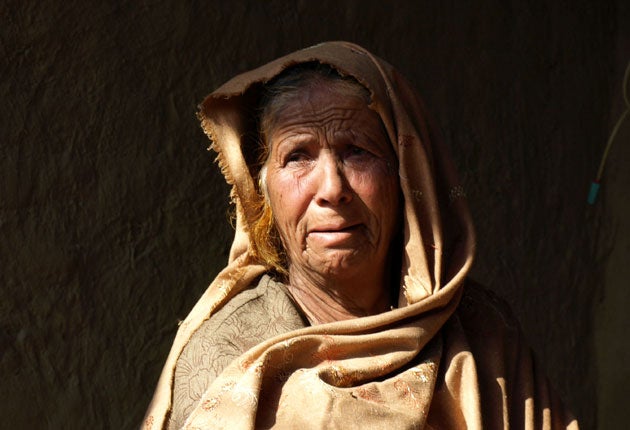The IoS Christmas Appeal: 'The children were burned and screaming'
A Taliban suicide bomb killed 93 in Pakistan on Friday. And government air strikes aimed at the insurgents kill ordinary villagers, too. Raymond Whitaker in Takhta Band, Pakistan, talks to those caught in the middle

Your support helps us to tell the story
From reproductive rights to climate change to Big Tech, The Independent is on the ground when the story is developing. Whether it's investigating the financials of Elon Musk's pro-Trump PAC or producing our latest documentary, 'The A Word', which shines a light on the American women fighting for reproductive rights, we know how important it is to parse out the facts from the messaging.
At such a critical moment in US history, we need reporters on the ground. Your donation allows us to keep sending journalists to speak to both sides of the story.
The Independent is trusted by Americans across the entire political spectrum. And unlike many other quality news outlets, we choose not to lock Americans out of our reporting and analysis with paywalls. We believe quality journalism should be available to everyone, paid for by those who can afford it.
Your support makes all the difference.Months after two bombs fell on this village in north-west Pakistan, the rubble-filled craters are littered with little squares of paper, all carrying the word "TIBET". This is the name of a popular local brand of cosmetics.
In the brick building that once stood here, Tibet shaving soap, talcum powder and cold cream – "for naturally supple skin", according to the labels strewn everywhere – were packed. Last spring, when Pakistani forces moved into the Swat and Buner valleys to drive out the Taliban militants who had seized control of both districts, possible strongpoints such as the Tibet plant were attacked from the air to deny their protection to the extremists. All according to the military textbook, but the building was surrounded by mud-brick houses of ordinary villagers, 11 of whom died.
Two of the victims were the wife and eldest son of Afzal Khan, 34. Sitting outside his still half-wrecked house, he describes how the battle against the Taliban in Pakistan, backed by Britain and its allies with the aim of making their own people safer, can destroy lives in seconds. "The first bomb did all the damage here," he says. "We were buried in rubble. The smaller children were burned, and were screaming." Afzal's mother, Sardara, who suffered injuries to her back and legs when the roof collapsed, begins crying at the memory.
The family all survived the first bomb. Afzal's wife, Nasrat, and their eight-year-old son Amanullah died in the second blast – because, by a cruel irony, they were the first to be pulled from the ruins of their home. "As soon as they were free, Nasrat and Amanullah ran away, and were caught by the second bomb," he says. "I was willing to lose my own life, but I can't accept the loss of my child."
Nearby there is evidence of the savagery of the fighting in the area, which is close to the city of Mingora, capital of Swat. Next to a flour mill half-demolished by air strikes, soldiers man a checkpoint on a bridge. Heavy traffic has to ford the river below, however, because a truck bomb has blown a hole clean through the roadway. In May, with mortars exploding nearby, Afzal and the other men of the village waited overnight with the dead bodies until they could be buried, then fled on foot. He spent three harrowing nights in an open field with his five remaining children before they reached safety.
ActionAid, the charity supported by The Independent on Sunday Christmas appeal, brought aid to the refugee camps where many of Buner and Swat's 2.2 million people fled. Now that most have returned home, it is continuing to help. Food and cooking utensils are being supplied to those who lost everything, farmers are receiving seeds, fertiliser and livestock to resume their livelihoods and counselling is being offered to adults and children traumatised by the conflict. Among other projects are "cash for work" schemes for 1,000 families to clear rubble, repair roads and restore village irrigation channels, and extensive support to the education system.
The extent of help that is needed becomes evident when one meets people like Afzal Khan, who still seems stunned by what happened to his family. He and his brother have managed to rebuild enough of the house to shelter 11 people – Afzal and his five children, his brother and his wife, who have one child, and two grandparents – in one room through the winter. "Nearly all the money I had saved, and all the grain I had harvested, was destroyed," says Afzal. "I had to borrow just to build what you see, and I can't afford to do any more. All the furniture was given to us by our neighbours." His father, Ghulam Jan, who is in his eighties, adds: "We have nothing, and winter is coming."
Still tearful, Sardara says: "I am very sad for the children. The older girls have to look after the younger ones, because I still have trouble moving. We do our best, but we can never replace their mother."
How your donation will help
£8 will provide counselling for a woman traumatised by conflict.
£40 will give a woman a sewing machine; another £13 pays for the training and materials to start a business.
£100 trains a teacher to counsel the many children traumatised by conflict.
£750 is needed to repair and rebuild each school damaged during the conflict in Buner.
To donate now click here: www.actionaid.org.uk/ios
Join our commenting forum
Join thought-provoking conversations, follow other Independent readers and see their replies
Comments